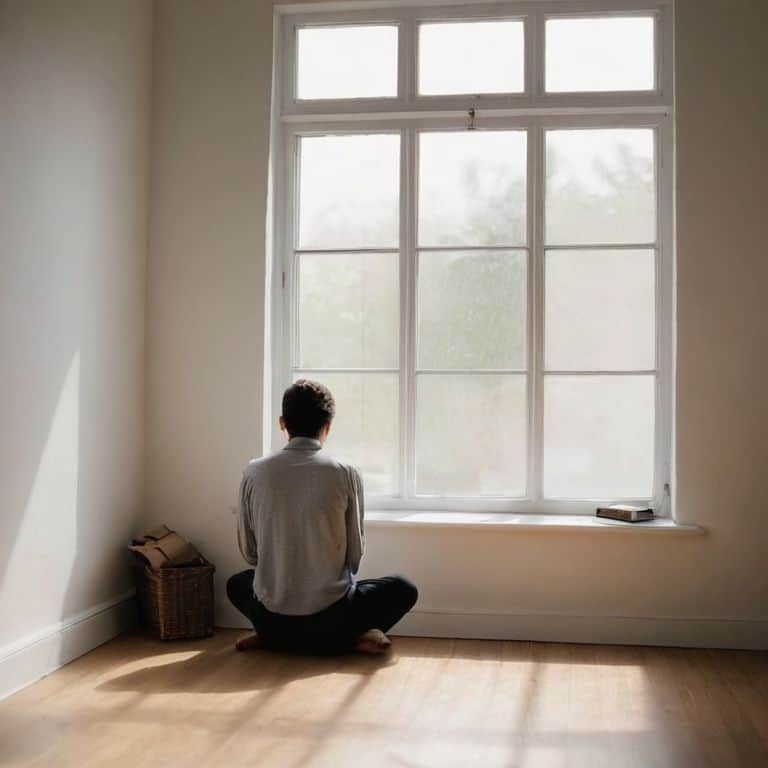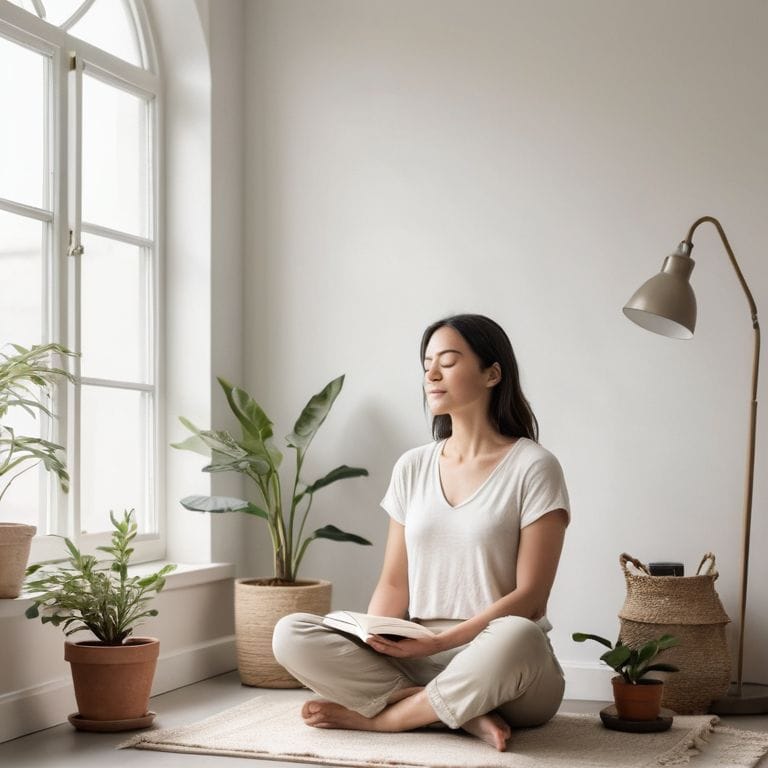I still remember the day I realized I needed to declutter my mind. I was sitting in my small urban garden, surrounded by the peaceful sounds of nature, but my thoughts were a jumble of anxiety and overwhelm. I had been struggling to find a sense of calm and clarity, and I knew I wasn’t alone. Many of us are taught that learning how to declutter your mind requires a drastic overhaul of our thoughts and habits, but I’ve found that this approach often leads to more stress and frustration. The truth is, simplifying your mental space can be a gentle and gradual process.
In this article, I’ll share my personal approach to how to declutter your mind, one that focuses on small, achievable steps rather than grand transformations. You’ll learn how to identify the key areas of mental clutter that are holding you back, and how to create a simple, actionable plan to address them. My goal is to provide you with practical tools and techniques that you can use to start clearing your mind and finding a sense of calm and clarity, starting today. Whether you’re feeling overwhelmed by work, relationships, or simply the demands of daily life, I’m here to offer a supportive and non-judgmental guide to clearing the mental clutter that’s been weighing you down.
Table of Contents
Guide Overview: What You'll Need

Total Time: 1 hour 15 minutes
Estimated Cost: $0 – $10
Difficulty Level: Easy
Tools Required
- Journal (for writing down thoughts)
- Pencil (for journaling)
- Timer (for setting focus intervals)
- Comfortable seating (for meditation)
- Calming music (optional)
Supplies & Materials
- Blank paper (for brainstorming)
- Colored pens (for categorizing thoughts)
- A quiet space (for reflection)
Step-by-Step Instructions
- 1. First, let’s start by acknowledging that decluttering your mind is a process that requires patience and kindness towards yourself. Begin by setting aside a quiet, uninterrupted time to reflect on what’s been occupying your thoughts. Take a few moments to breathe deeply and let go of any immediate distractions, like turning off your phone or finding a peaceful spot in nature.
- 2. Next, grab a notebook and pen, and start writing down everything that comes to mind when you think about what’s cluttering your thoughts. This could be worries, tasks, memories, or anything else that feels like it’s taking up space. The goal here is to get everything out of your head and onto paper, so don’t worry too much about organizing your thoughts just yet – just focus on the brain dump.
- 3. Now, take a step back and look at what you’ve written. Start to categorize your thoughts into groups, like work, relationships, or personal goals. You might find that certain themes or patterns emerge, which can help you understand what’s really going on in your mind. As you categorize, remember to be gentle with yourself – the point of this exercise isn’t to judge your thoughts, but to understand them.
- 4. With your thoughts categorized, it’s time to start prioritizing. Take each group and identify the most important or urgent items. Ask yourself, what can I control, and what can I let go of? Be honest with yourself about what you can realistically tackle, and what might be better left alone for now.
- 5. For each priority item, break it down into smaller, manageable tasks. This is where the power of small steps comes in – by focusing on one task at a time, you can start to make progress without feeling overwhelmed. Write down each task and create a simple plan for when and how you’ll tackle it.
- 6. As you start to work through your tasks, remember to practice self-care along the way. This might mean taking short breaks to stretch or meditate, or scheduling time for activities that bring you joy and relaxation. By taking care of your physical and emotional needs, you’ll be better equipped to handle the mental clutter that’s been weighing you down.
- 7. Finally, make a commitment to yourself to regularly review and revise your priorities. Life is constantly changing, and what’s important to you today might shift over time. By scheduling regular check-ins with yourself, you can stay on top of your mental clutter and continue to make progress towards a clearer, more peaceful mind.
Clear Mind Ahead

As we journey towards a clearer mind, it’s essential to incorporate mindfulness exercises for clarity into our daily routine. These exercises can be as simple as taking a few minutes each day to focus on our breath, observe our thoughts, and let go of distractions. By doing so, we can begin to silence the mental chatter and gain a deeper understanding of ourselves.
In addition to mindfulness, journaling can be a powerful tool for achieving mental clarity. The benefits of journaling for mental health are numerous, from processing emotions to tracking progress. By putting our thoughts and feelings into words, we can gain a new perspective on our lives and identify areas where we can improve. This, in turn, can help us develop strategies for reducing stress and anxiety, leading to a more peaceful and focused mind.
To maintain our mental clarity, it’s crucial to prioritize self-care and make it a non-negotiable part of our daily routine. This can include activities like meditation, reading, or simply taking a relaxing bath. By making time for self-care, we can improve our overall mental well-being and set ourselves up for success. As we continue on this journey, we’ll find that our minds become clearer, and our lives become more manageable, one step at a time.
Journaling for Mental Health
Journaling is a powerful tool for mental health, allowing you to process your thoughts and emotions. By dedicating a few minutes each day to writing down your feelings, you can begin to identify patterns and gain clarity. Start by setting aside a quiet time and space, then simply write whatever comes to mind – don’t worry about grammar or spelling.
As you journal, focus on the present moment, and let your thoughts flow freely. This practice can help you release stress and anxiety, and gain a clearer understanding of yourself. Remember, journaling is a personal and individual experience, so feel free to experiment and find what works best for you.
Mindfulness Exercises for Clarity
To cultivate a clear mind, I recommend incorporating mindfulness exercises into your daily routine. Start with short, manageable sessions – even 5 minutes a day can make a significant difference. Try focusing on your breath, noticing the sensation of the air moving in and out of your body. When your mind wanders, gently bring your attention back to your breath without judgment.
You can also explore body scan meditation, where you lie down or sit comfortably and bring awareness to each part of your body, starting from your toes and moving up to the top of your head. This helps release physical tension and calm your mind. Remember, the goal of mindfulness isn’t to achieve a specific state, but to cultivate awareness and kindness towards yourself in the present moment.
5 Gentle Steps to a Clearer Mind
- Simplify Your Digital Life: Start by unfollowing or muting accounts that bring you stress or anxiety on social media, and consider implementing a ‘no screens’ rule for at least an hour before bedtime
- Prioritize Sleep: Aim for 7-9 hours of sleep each night to help your brain process and clear out mental clutter, and establish a consistent bedtime routine to signal to your body that it’s time to wind down
- Schedule Downtime: Make time for activities that bring you joy and help you relax, such as reading, taking a walk, or practicing yoga, and treat these appointments with yourself as non-negotiable
- Practice Gratitude: Take a few minutes each day to reflect on the things you’re thankful for, no matter how small they may seem, and write them down in a gratitude journal to help shift your focus to the positive
- Set Realistic Goals: Break down large tasks or projects into smaller, manageable chunks, and focus on making progress one step at a time, rather than getting overwhelmed by the big picture
Key Takeaways for a Clearer Mind
By incorporating mindfulness exercises into your daily routine, you can significantly reduce mental clutter and improve your focus
Journaling is a powerful tool for mental health, allowing you to process your thoughts, identify patterns, and gain clarity on your goals and priorities
Remember, decluttering your mind is a journey, not a destination – be patient, kind, and compassionate with yourself as you work through the process, and don’t hesitate to reach out for support when you need it
A Gentle Reminder
The greatest clutter we face is not in our surroundings, but in the untold stories, unmade decisions, and unresolved emotions that fill our minds; clearing this clutter is not about erasing the past, but about making space for the present.
Hannah Jensen
Embracing a Clearer Mindset

As we’ve journeyed through the steps to declutter your mind, remember that simplicity is key. We’ve explored the importance of mindfulness exercises for clarity, and how journaling can be a powerful tool for mental health. By incorporating these practices into your daily routine, you’ll be well on your way to a more peaceful state of mind. It’s essential to be patient and kind to yourself throughout this process, celebrating small victories along the way. Whether it’s taking a few minutes each day to breathe, or dedicating time to reflect on your thoughts and emotions, every effort counts.
As you move forward, keep in mind that decluttering your mind is a continuous process. It’s about embracing a mindset that values clarity, self-awareness, and intentional living. Don’t be too hard on yourself when your mind wanders – simply acknowledge the thought, and gently bring your focus back to the present moment. With time and practice, you’ll find that your mind becomes clearer, and you’ll be better equipped to handle life’s challenges with ease and confidence. Remember, the goal is not to achieve a completely clutter-free mind, but to cultivate a deeper understanding of yourself, and to live a more authentic, fulfilling life.
Frequently Asked Questions
How can I prioritize tasks and manage my time more effectively to reduce mental clutter?
Let’s simplify task management together. Start by making a list of everything on your mind, then categorize tasks into urgent, important, and can-wait. Focus on one urgent task at a time, and allocate specific time slots for each. Remember, I recommend using a planner or calendar to stay organized and on track.
What role does self-care play in maintaining a clear and clutter-free mind?
Self-care is essential to maintaining a clear mind. By prioritizing activities like meditation, reading, and spending time in nature, you can reduce mental clutter and increase focus. For me, self-care includes bookbinding and urban gardening – finding what works for you is key. Regular self-care helps calm your mind, making it easier to stay organized and focused.
Are there any specific mindfulness exercises or journaling prompts that can help me overcome recurring negative thoughts and emotions?
Let’s explore some helpful tools together. For mindfulness, try the “4-7-8” breathing technique or guided meditation apps like Headspace. For journaling, prompts like “What am I grateful for today?” or “What can I release to feel lighter?” can be great starting points to shift your focus and calm your mind.
